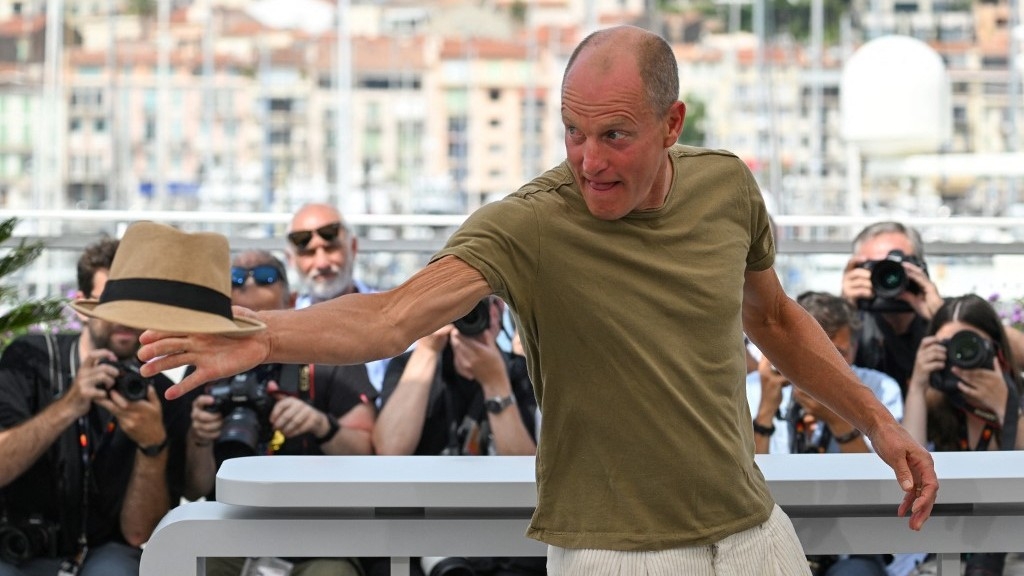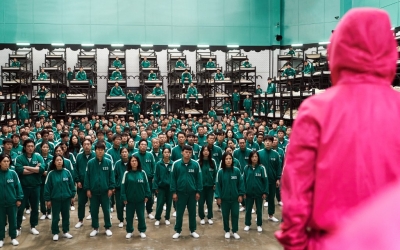How Triangle of Sadness trivialises the class struggle

The movie Triangle of Sadness famously includes a lengthy and exaggerated vomit scene, wherein a luxurious cruise ship is (non-realistically) drowned in the vomit of its gluttonous customers, right before the ship is targeted by African pirates.
The scene demarcates the line between the lavish representation of the lifestyles of the rich, allegorised in this cruise ship, and their downfall - first by their own decadence, and second by the assailant pirates. It takes the indulgence and decadence of the bourgeoisie, exploited by the camera in the first half of the film, to its grotesque extremes, and signals their subsequent demise.
Initially focusing on capitalism-as-consumerist indulgence, the film flips the visuals with the vomit scene, in order to both delight and disgust viewers. But this double cathartic effect fails to interrogate the film’s and the audience’s positionality within the capitalist system it satirises.
It further assures its bourgeois viewers, even though they thrive on a system of capitalist exploitation, of their superiority vis-a-vis the decadent and disgusting cruise passengers
By overplaying the depiction of capitalism as indulgence and underplaying the depiction of capitalism as exploitation, the film not only trivialises the class struggle, but also undermines its own message.
Though the trope of consumer capitalism as a luxurious cruise ship is hardly original, the film skilfully uses it to present a three-tiered class system of customers, service providers and workers - or four-tiered, if we consider the distinction between the rising models as salaried upper-middle-class and the businessmen as upper-class.
New MEE newsletter: Jerusalem Dispatch
Sign up to get the latest insights and analysis on Israel-Palestine, alongside Turkey Unpacked and other MEE newsletters
The film, however, busies itself with the burlesque of the extravagant and frivolous upper classes, and does little to examine the plight of the workers and service providers. The stress on the depiction of capitalists as gluttonous pigs, while sometimes useful in anti-capitalist propaganda, risks, in the absence of an emphasis on exploitation, to construct a straw man that can easily collapse as a critique of class by the appearance of the next well-meaning, self-restrained businessman.
It further assures its bourgeois viewers, even though they thrive on a system of capitalist exploitation, of their superiority vis-a-vis the decadent and disgusting cruise passengers.
Bourgeois frivolity
The lower classes, on the other hand, appear as inconvenienced, rather than exploited, by the rich; the zenith of exploitation is when a rich woman insists that the entire crew take a swim. This caricatures bourgeois frivolity, rather than capitalist exploitation.
By targeting capitalism’s empty indulgence in material goods, rather than the system of exploitation that sustains this indulgence, the film criticises capitalism from the standpoint of those who can afford to renounce these goods - a bourgeois critique at best, as opposed to a working-class critique that starts from the standpoint of the equal distribution, rather than renunciation, of these goods.
Ultimately, the class struggle is reduced to an unfunny banter between the ship’s captain, who turns out to be a Marxist (but not a socialist, as he proclaims) and one of the ship’s passengers, a Russian businessman, against the backdrop of the vomit of the other passengers, while a storm foreshadows the wrecking of the ship.
Antagonistic class positions are thus presented on equal footings, and their antagonism is banalised as something that can be resolved by provocative jokes and quotes from Marxist and/or pro-capitalist literature (in turn, banalising Marxism, which was originally grounded in actual struggle, rather than something to be recited in a friendly verbal duel with capitalists), while the ship is being wrecked by outside forces - and perhaps by the decadence of the bourgeoisie, but not by the class struggle.
The banter and the vomit thus together present a cathartic purge wherein the film’s bourgeois audience members atone for their capitalist guilt, and then go back to enjoy their capitalist lives feeling a little better.
Apology for exploitation
Shipwrecked on what seemed to be a deserted island and in despair of outside help, a handful of survivors attempt to start society anew. In this episode, exploitation that was absent or invisible in the previous episodes becomes evident.
I would prefer a film that digressed in its second half to follow the struggles, plights and stakes of the victims of the system, especially those who disrupt it
A housekeeper - conveniently for the strong-armed allegory the film is trying to make, a service provider and not a member of an organised working class - turns out to be the only member capable of fishing and hunting, which in turn allows her to exploit the others in exchange for the food she provides.
At this moment, it is the former capitalist who starts advocating social justice (he quotes Marx verbatim, “from each according to his abilities, to each according to his needs”), whereas the housekeeper starts using the language of the boss. She ultimately creates a system of class and sexual exploitation, including a man whom she keeps as a sex servant and extorts by emphasising her role as a provider.
It thus seems as if exploitation is inevitable, and as if the lower classes are already charged with the potential of becoming, when given the chance, exploiters.
This cyclical narrative at worst becomes an apology for inevitable exploitation, and at best advocates a socialism and a feminism that are about the perpetuation of class and sexual subordination with an exchange of roles, rather than about breaking the cycle of oppression and striving for universal emancipation.
Victims and disruptors
While exploitation is made invisible throughout the first half of the film, the victims of global exploitation haunt it in the form of the African pirates who intervene in the narrative when they attack the ship.
Whereas they come from outside the world of the film, their tools - the hand grenade they toss at the ship signalling the beginning of their attack - come from within its world, as one of the passengers brags about how he manufactures these grenades and how his merchandise “is employed in upholding democracy all over the world”.
This is indeed a skillful deployment of a thread from the film to unravel the fabric of its world, and a witty note on the destructive nature of capitalism, especially as the attack is foreshadowed by the captain reading excerpts about how capitalism makes war for profit.
But then again, as the film does not show the pirates beyond one menacing scene where they toss their hand grenades, the allegory falls again into the self-involved auto-critique of the bourgeoisie that is destroying itself.
Those who break the system are only relevant inasmuch as, and only in the moment wherein, they disrupt bourgeois indulgence and decadence. Personally, and at the expense of seeming to criticise the movie for what it did not do, I would prefer a film that digressed in its second half to follow the struggles, plights and stakes of the victims of the system, especially those who disrupt it.
The views expressed in this article belong to the author and do not necessarily reflect the editorial policy of Middle East Eye.
Middle East Eye delivers independent and unrivalled coverage and analysis of the Middle East, North Africa and beyond. To learn more about republishing this content and the associated fees, please fill out this form. More about MEE can be found here.







